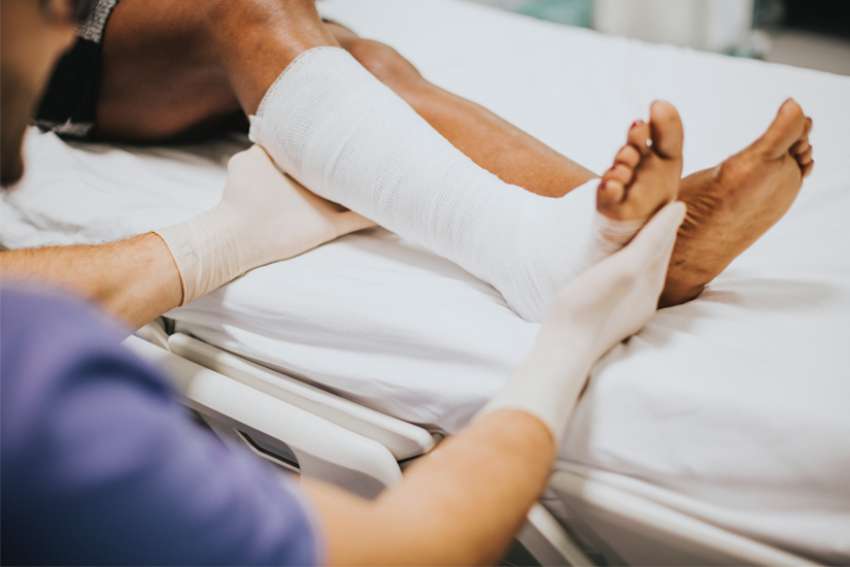The first part of that story is true, and the latter part should quietly be left untested. Suffice to say that I broke two bones in my right leg in three places, shoved them through my ankle, and then discovered that I was, for all intents and purposes, allergic to pain killers.
I won’t go into the ghastly story of what it was like to go three days without pain medication or food as I waited for the needed surgery. It is enough to say that by the time I’d been returned home, with more metal inside my leg than Iron Man has outside of his, I felt pretty beaten up.
The recovery was slow and tedious. I discovered something that all civilians should know about — the toxic, paralyzing quality of daytime television. If anything was designed to prompt someone to return to work speedily it is surely that!
This type of injury is humbling on so many levels that it is difficult to catalogue. As a busy, single father, it was incredibly difficult to have to ask my daughter to fetch water, crutches and food on a regular basis. And though she handled it with grace and kindness, it was surely a tedious imposition on her. Similarly, to have to call my son to drive me into town to pick up medicine, or help me with a household chore, was embarrassing on so many levels. There is an old joke about parents needing to live long enough so that they can finally become a burden on their kids. But I wasn’t ready, this soon, to call in the favour.
When it was finally time to venture out into the world and return to work, the logistics felt insurmountable. First, and as luck would have it, the elevator in our administrative building is being replaced and therefore out of commission until November. My office is on the top floor. As one of the fastest-growing universities in Alberta, we have been on a hiring phase and as such have quickly filled up all our offices and vacant spaces. So where to put me became a real quandary.
Second, before I could be stored somewhere out of the way, I had to get to the university to begin with. And so began a cavalcade of accommodating and extremely patient staff who volunteered to pick me up and then drop me off after work. In my mind’s eye I saw my team congregating in an ill-lit office and drawing straws until the poor wretch with the shortest straw sighed in exasperation and reluctantly set off to fetch me. In reality, people were gracious, and kind, patient and flexible: a testament to the people who work at St. Mary’s University.
Despite this kindness, the fact remains that it is a difficult thing to feel as though you are imposing on people, especially when there doesn’t seem to be an end in sight. I am trapped, with severe limited mobility, for what will be months on end. And the work must be done. So I need to accept the help that is so generously offered.
As startling as the impact of the injury has been, another eye opener has definitely been that of inhabiting the world of those who are confined to wheelchairs. Even though my injury is temporary, I have had the opportunity to view our campus, and the world beyond it, from the perspective of someone with limited mobility. It is humbling. So few of our structures and spaces are truly accessible, even those that are fully up to code.
For example, we have improved the entrance ramp to our administrative building, but I discovered that the aluminum doorframe set into the flooring is so high that a wheelchair can’t roll over it.
Rolling across campus I was dismayed to discover that minor unevenness in the pavement has catastrophic implications for a wheelchair, in one case almost tipping the entire chair (and me) over. Needless to say I will participate in our Accessibility Committee with a renewed energy to find solutions.
Equally surprising was the sheer number of people who walked straight past me and took no notice of me, simply because of my position in the wheelchair. And when one guest in particular was redirected back towards me by my staff, the individual looked puzzled. “That’s your president?” he asked, prompting me to wonder what in the world about me being in the wheelchair suggested that I couldn’t be in charge?
Those timeworn clichés about walking a mile in another’s shoes, or seeing through different lenses, really do have meaning. How can we truly know our neighbours if we don’t take the time to see through their eyes? Or more to the point, we need to see and understand one another through God’s eyes. “For the Lord sees not as man sees: man looks on the outward appearance, but the Lord looks on the heart” (1 Samuel 16:7).
I won’t suggest that I’m happy to have had this accident, but I can say that I won’t take the many and even unexpected lessons I’ve learned because of it for granted.
(Turcotte is president of St. Mary’s University in Calgary.)


